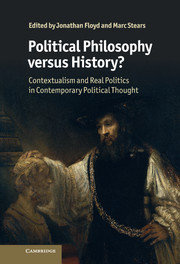 Political Philosophy versus History?
Political Philosophy versus History? Book contents
- Frontmatter
- Contents
- Note on the contributors
- Acknowledgements
- Introduction
- Part I The challenge of contextualism
- 1 Rescuing political theory from the tyranny of history
- 2 From historical contextualism, to mentalism, to behaviourism
- 3 Contingency and judgement in history of political philosophy: a phenomenological approach
- 4 Political philosophy and the dead hand of its history
- Part II The challenge of realism
- Index
- References
4 - Political philosophy and the dead hand of its history
from Part I - The challenge of contextualism
Published online by Cambridge University Press: 05 June 2012
- Frontmatter
- Contents
- Note on the contributors
- Acknowledgements
- Introduction
- Part I The challenge of contextualism
- 1 Rescuing political theory from the tyranny of history
- 2 From historical contextualism, to mentalism, to behaviourism
- 3 Contingency and judgement in history of political philosophy: a phenomenological approach
- 4 Political philosophy and the dead hand of its history
- Part II The challenge of realism
- Index
- References
Summary
This chapter explores the relation between political philosophy and the history of political thought. It focuses on this question: are they allies or rivals? The question arises in part because the two disciplines so evidently share a very large number of figures and texts. That the list stretches from Plato and Aristotle through Hobbes and Locke to Marx and Mill is probably non-contentious. Whether it extends to (say) Rawls and Habermas is more problematic. Certainly, these authors are very likely to be studied in courses on ‘contemporary political philosophy’ and much less likely to appear in reading lists for ‘history of political thought’. For the purposes of studying their philosophical ideas they are not historical figures – at least not yet.
I
Why might we separate Rawls and Habermas from other major political philosophers in this way? One plausible suggestion is that we, their current readers, are also their contemporaries, and this means that we share an implicit context of thought and understanding with them that we do not share with Hobbes or Locke. It is this that enables us to read their philosophy straight off the page, so to speak, whereas by contrast, the context of important thinkers from the past needs to be made explicit, if we are to understand them. That is why we need to engage in historical inquiry — the history of thought.
- Type
- Chapter
- Information
- Political Philosophy versus History?Contextualism and Real Politics in Contemporary Political Thought, pp. 84 - 102Publisher: Cambridge University PressPrint publication year: 2011
References
- 2
- Cited by


